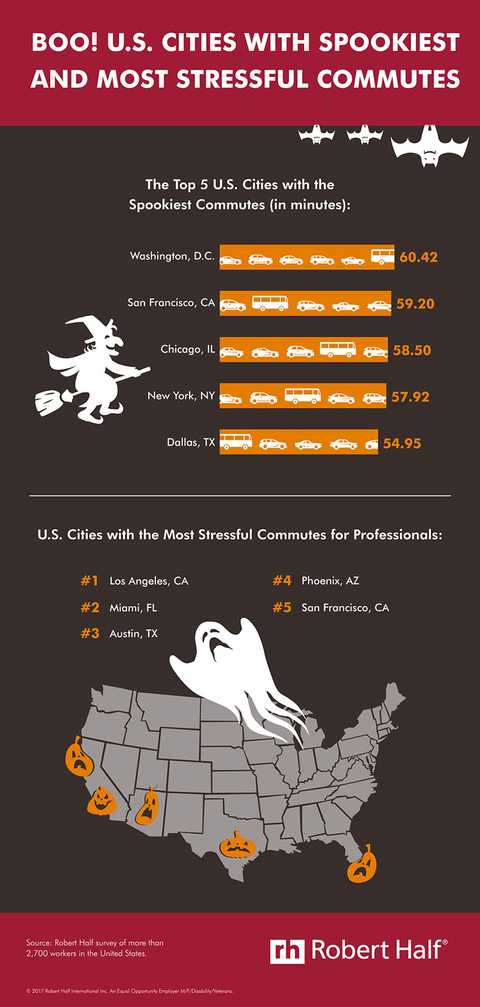As the spookiest day of the year approaches, staffing firm Robert Half highlights the cities with the most hair-raising commutes. The company surveyed workers from 27 major U.S. cities to determine how long they spend commuting to and from the office and which cities have the most stressed-out commuters.
Robert Half commissioned an independent research firm to collect the data. More than 2,700 workers in 27 U.S. markets were surveyed to determine average commute times and the cities with the most stressful commutes. The survey was conducted in September 2017.

Average Roundtrip Commute Times
- Washington, DC – 60.42 minutes
- San Francisco, CA – 59.20 minutes
- Chicago, IL – 58.50 minutes
- New York, NY – 57.92 minutes
- Dallas, TX – 54.95 minutes
- Seattle, WA – 54.22 minutes
- Boston, MA – 53.75 minutes
- Los Angeles, CA – 53.68 minutes
- Philadelphia, PA – 51.86 minutes
- Austin, TX – 51.85 minutes
- Houston, TX – 50.56 minutes
- Atlanta, GA – 49.90 minutes
- Miami, FL – 49.16 minutes
- Detroit, MI – 46.87 minutes
- Pittsburgh, PA – 46.38 minutes
- San Diego, CA – 46.19 minutes
- Denver, CO – 46.11 minutes
- St. Louis, MO – 45.67 minutes
- Phoenix, AZ – 45.53 minutes
- Cincinnati, OH – 45.42 minutes
- Raleigh, NC – 44.68 minutes
- Minneapolis, MN – 43.44 minutes
- Indianapolis, IN – 43.34 minutes
- Charlotte, NC – 42.70 minutes
- Cleveland, OH – 42.00 minutes
- Des Moines, IA – 40.94 minutes
- Salt Lake City, UT – 40.41 minutes
Most Stressful Commutes
Professionals with the longest commutes aren't necessarily the most anxious. When asked about their stress levels stemming from commute, here is how U.S. commuters ranked their cities, from most to least stressful:
- Los Angeles, CA
- Miami, FL
- Austin, TX
- Phoenix, AZ
- San Francisco, CA
- Houston, TX
- Dallas, TX
- Washington, DC
- New York, NY
- Atlanta, GA
- Detroit, MI
- Pittsburgh, PA
- Boston, MA
- Chicago, IL
- Denver, CO
- Philadelphia, PA
- Seattle, WA
- Cincinnati, OH
- San Diego, CA
- Charlotte, NC
- Raleigh, NC
- Indianapolis, IN
- Salt Lake City, UT
- Minneapolis, MN
- St. Louis, MO
- Cleveland, OH
- Des Moines, IA
Can Employers Lessen Commute Headaches?
Commute times rank as a top concern among employees when considering a job offer, according to feedback gathered from Robert Half's recruiters.
"Good managers keep a constant gauge on team morale. You should continually talk to employees about their commutes to identify pain points and possible workarounds," said Josh Howarth, district president for Robert Half. "Every organization is different, and no single magic bullet can solve all commuting problems."
Howarth recommends having these conversations sooner rather than later: "Winter weather and the end of daylight savings time often result in longer commutes. Get plans in place now to offer flexible options before workers feel the full impact."
If you're an employer concerned that a lengthy commute could be hurting retention efforts or scaring away potential candidates, consider the following solutions:
- Survey your employee base. Talk to your workers individually or conduct surveys to gauge how much their commutes might be impacting their workday. Research surrounding firms and companies in your industry to see how they handle commuting issues.
- Offer staggered work schedules. Give employees the option to work during hours when the traffic isn't heavy. Staggered schedules can also provide the benefit of longer coverage.
- Consider telecommuting options. Many companies allow employees to work remotely on occasion. If workers' responsibilities allow, consider allowing telecommuting several days a week.
- Increase commuting benefits. If you are already offering commuting benefits, find out how much they are being used. Once you know which are being most utilized, you can make educated decisions to enhance or modify them. If you don't offer these benefits, consider adding some, like subsidized public transportation or company-sponsored carpooling.
Related Stories
Stats: Over Half of Business Travelers Can Book Outside Policy
Stats: Three in Four Who Book Cruises Offline Use a Travel Agent
Stats: U.S. Travel Buyer Compensation Up 5.5%, Says GBTA
Stats: 43% of Ensemble Agents Say Terrorism Hasn’t Impacted Bookings